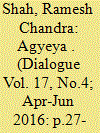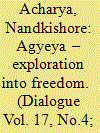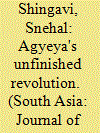| Srl | Item |
| 1 |
ID:
148861


|
|
|
|
|
| Summary/Abstract |
Sachchidananda Hirananda Vatsyayan “Agyeya” was born in
Kushinagar (UP) which his archaeologist father was excavating. He
came to be known as ‘Agyeya,’ because his early writings, smuggled
out of prison, were published under conditions in which the author’s
name could not be revealed. During his postgraduate studies in Lahore,
he was arrested for revolutionary activities and spent several years in
prison
|
|
|
|
|
|
|
|
|
|
|
|
|
|
|
|
| 2 |
ID:
148862


|
|
|
|
|
| Summary/Abstract |
“Sociality is to be realized as not an antonym but an extension of the
realization of freedom. It is only sociality of mankind which serves as
the foundation of the building of freedom. Man is free not only in
himself but in the other. He is free only to the extent he contributes in
making society free” (Shashvati; p.38).
|
|
|
|
|
|
|
|
|
|
|
|
|
|
|
|
| 3 |
ID:
147202


|
|
|
|
|
| Summary/Abstract |
Sachchidananda Hiranand Vatsyayan, also known as ‘Agyeya’, famously penned his three-volume modernist Hindi novel, Shekhar: Ek Jivani (Shekhar: A Life) while he was imprisoned by the British during 1930–33 for his participation in revolutionary terrorist activities. The novel, however, was incompletely published: only the first two volumes were released (in 1941 and 1944, respectively). The incompleteness of Agyeya's Shekhar manifests both writerly dissatisfaction and the transformation of the political landscape in newly independent India. Shekhar, a story of the life of a revolutionary, becomes impossible once revolution is undesired and impossible. The form of the novel, its revolutionary ambition and the construction of a writerly sensibility are all exhausted in the same moment. While revolutionary ambition is normally associated in Hindi with the realism of the All India Progressive Writers Movement (AIPWA), Agyeya's modernism was born out of aesthetic debates that he had with the poets affiliated to the AIPWA and from his Trotskyist politics.
|
|
|
|
|
|
|
|
|
|
|
|
|
|
|
|